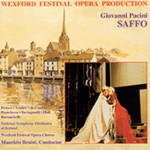
Saffo (Complete Opera)
 $35.99
Out of Stock
$35.99
Out of Stock6+ weeks add to cart
PACINI
Saffo (Complete Opera)
Francesca Pedaci / Carlo Ventre / Reoberto De Candia / Wexford Festival Opera Chorus / National Symphony Orchestra Of Ireland / Maurizio Benini
[ Marco Polo Opera Classics / 2 CD ]
Release Date: Tuesday 30 June 2009
This item is currently out of stock. It may take 6 or more weeks to obtain from when you place your order as this is a specialist product.
"Pedaci's has refreshing purity and clean voice ... Congratulations are due to the record company"
- Gramophone
"Francesca Pedaci's Saffo reveals a commanding soprano"
- BBC Music Magazine
By early 1835 Giovanni Pacini had written almost fifty operas during the course of a career launched in 1813. He was tired and he was discouraged. Not only had his earlier works been overshadowed by the force of Rossini's musical personality, but even after the departure of the Pesarese from Italy in 1823, Pacini's star did not shine brighter. In his fascinating Memoirs, the composer examined these years and acknowledged his own limitations. Though the first performances of his Irene, o L' Assedio di Messina (Naples, Teatro San Carlo, 30th November 1833) were largely rescued by the singers, Pacini knew the creative vein he had been mining was empty. Maturing under the spell of Rossini, he had not yet shown himself to be more than an able follower: "I began to realise that I should withdraw from the field - Bellini, the divine Bellini, and Donizetti had surpassed me."
He tried his hand once again during the carnival season of 1835, writing Carlo di Borgogna for the Teatro La Fenice but it was a dismal failure. Pacini's judgments about his operas through 1835 are harsh, even unduly so:
"I gave little though to honour myself and my art as I should have... They called me Maestro delle cabalette because my cabalettas generally had the virtue of spontaneity, elegance, and form. Everyone believed it cost me little to find a melodic thought of some novelty, since, it was said, that was a matter of innate talent and nothing else."
Though Pacini insisted he worked hard even on cabaletta tunes, always seeking to fashion them in ways different from his contemporaries, he admitted that his music had defects: